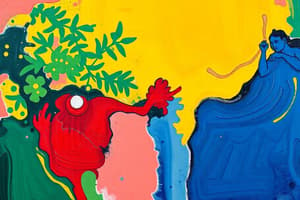Podcast
Questions and Answers
What differentiates literary naturalism from earlier forms of literary realism?
What differentiates literary naturalism from earlier forms of literary realism?
- Believes in progress towards a better future
- Depicts characters as products of their environments and genetic inheritance (correct)
- Views individuals more positively
- Presents characters with no social pressures
What type of subjects were commonly explored in literary naturalism?
What type of subjects were commonly explored in literary naturalism?
- Equality, love, and harmony
- Wealth, honesty, and justice
- Poverty, crime, and corruption (correct)
- Education, industry, and progress
How do naturalistic works typically conclude?
How do naturalistic works typically conclude?
- On an optimistic note
- With a moral lesson
- On a pessimistic note (correct)
- With an open ending
What aspect of human beings do naturalists believe largely determines their actions?
What aspect of human beings do naturalists believe largely determines their actions?
How did naturalism impact Western thought and culture?
How did naturalism impact Western thought and culture?
Flashcards are hidden until you start studying
Study Notes
Naturalism
Naturalism is a philosophical and artistic movement that emerged in the late 19th century across various fields such as literature, theater, art, music, and science. It gained prominence around 1875 with the publication of Émile Zola's novel "La Fortune des Rougon," which became known as the first novel of the French school of naturalism. This movement sought to portray reality faithfully by studying nature and human behavior through scientific methods.
Literary Naturalism
Literary naturalism was a significant aspect of the broader naturalist movement, particularly in the United States and France. In America, Henry James, Edith Wharton, and Theodore Dreiser were among the most notable figures associated with this movement. These writers aimed to depict life as it truly was, often focusing on urban settings and social problems. They also explored the darker sides of human nature, emphasizing the influence of heredity over environment.
One of the key characteristics of literary naturalism was its emphasis on realism, which meant focusing on concrete details and everyday experiences rather than abstract concepts or idealized scenarios. Writers like Zola and Anton Chekhov, another influential figure in literary naturalism, used vivid detail to convey their characters' inner lives and external circumstances.
Another important feature of literary naturalism was its focus on psychology. Characters were depicted as products of their environments and genetic inheritance, with their actions driven by instinctive drives and social pressures. This approach contrasts with earlier forms of literary realism, which tended to view individuals more positively and saw society as capable of progressing towards a better future.
The themes explored in literary naturalism were often complex and challenging. Issues such as poverty, crime, and corruption were common subjects for these authors, who sought to expose the underlying social issues behind these phenomena. Their works often ended on a pessimistic note, reflecting the belief that human beings are largely determined by their biology and their environment.
In conclusion, naturalism has been a transformative cultural force, leaving its mark on Western thought and culture from the mid-19th century onwards. Its impact can still be felt today, with echoes of its concerns and insights resonating within many artistic movements.
Studying That Suits You
Use AI to generate personalized quizzes and flashcards to suit your learning preferences.




